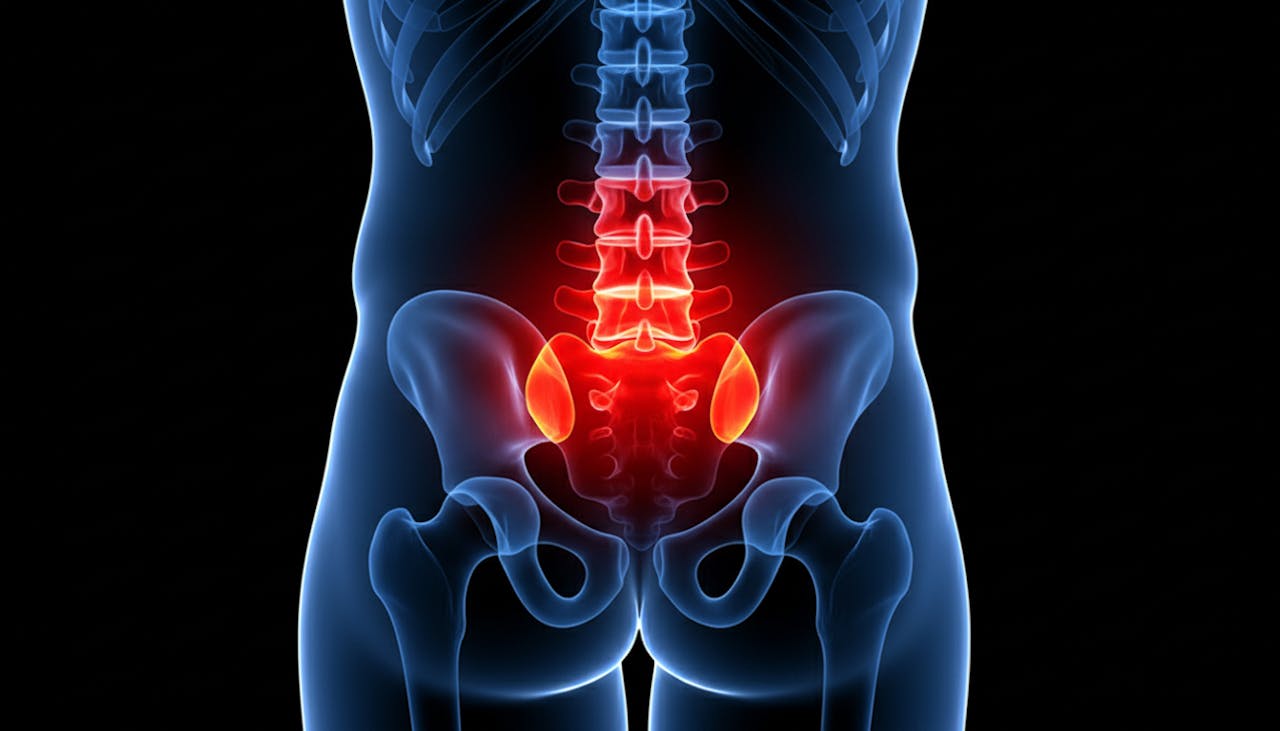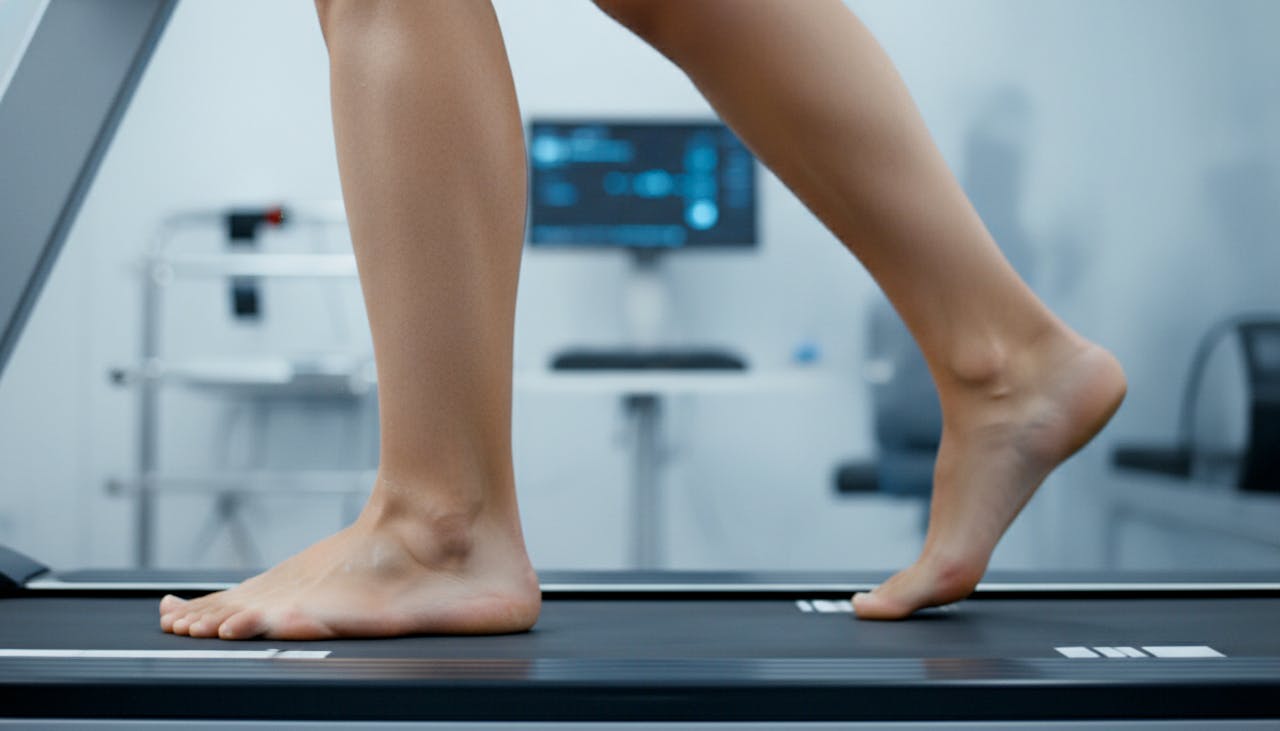
Herniated Disc (Slipped or Ruptured Disc)
A herniated disc occurs when the soft, gel-like centre of a spinal disc bulges out through its tough outer layer, often compressing nearby nerves and causing pain, numbness, or weakness that radiates down to the feet.
Overview
What is it?
Between the vertebrae of your spine are rubbery cushions called discs, which act as shock absorbers. A herniated disc (often misleadingly called a "slipped disc"—discs cannot actually slip out of place) happens when the tough outer ring of the disc tears, allowing the soft inner jelly to leak out. If this material presses on a spinal nerve, it causes significant issues further down the leg.
How common is it?
It is a very frequent cause of lower limb pain, particularly affecting adults aged between 30 and 50. It is often a result of gradual, age-related wear and tear known as disc degeneration, though acute injuries can also cause it.

Symptoms & Causes
What are the symptoms?
Surprisingly, not everyone with a herniated disc has back pain. For many of our patients, the primary symptoms are in the leg or foot. This can include sharp, shooting pain traveling down the buttocks and leg (sciatica), tingling ("pins and needles") in the toes or foot, and numbness.
What does it feel like?
The leg and foot pain is often described as intense, electric, or burning. A concerning symptom that requires immediate attention is unexpected weakness—such as finding you cannot lift your big toe or experiencing "foot drop" (catching your toes on the ground when walking).
What causes it?
- General Wear and Tear: As we age, discs lose water content and become less flexible, making them more prone to rupturing with even minor strain or twisting.
- Improper Mechanics: Lifting heavy objects using your back muscles instead of your legs.
- Sudden Trauma: A fall or a sharp blow to the back.
Some health conditions can include:
- Obesity: Excess body weight places significant extra stress on the discs in the lower back.
- Sedentary Lifestyle: Weak core and back muscles reduce the support for your spine.

How is it Diagnosed?
Patients often arrive at Foot Factor convinced they have a foot injury because that is where the pain is most severe. Our role is to identify when foot pain is actually referred from the spine.
What tests are used to diagnose it?
- Neurological Examination: We will meticulously test the sensation in different areas of your feet, check your lower limb reflexes, and assess muscle strength (e.g., resisting pressure with your big toe) to pinpoint which spinal nerve might be compressed.
- Straight Leg Raise Test: Lifting your leg while you are lying down typically reproduces the shooting leg pain if a disc is pressing on the nerve.
- MRI Referral: While we can strongly suspect a herniated disc clinically, an MRI scan is required to definitively visualise the disc and the extent of the nerve compression.
Foot Factor provides Expert Podiatry Treatment Tailored to You.
At Foot Factor, our podiatrists specialise in diagnosing and treating foot pain with precision and expertise. With advanced gait analysis, bespoke orthotics, and sports-focused podiatry care, we don’t just identify the problem—we provide a targeted solution to get you back to moving pain-free. Book a consultation today and take the first step toward lasting relief.

How is it Treated?
While primary treatment of the disc itself may involve physiotherapy or spinal specialists, Foot Factor plays a critical role in managing the impact on your mobility during recovery.
- Shock Absorption: Every time your heel strikes the ground, shockwaves travel up your leg to your spine. We can prescribe highly cushioned custom orthotics and advise on appropriate footwear to dampen these shockwaves, reducing irritation to the healing disc.
- Gait Modification: If nerve weakness has altered how you walk (e.g., causing you to drag a foot or limp heavily), we provide gait retraining advice and supportive devices to normalise your walking pattern and prevent secondary strain on your other hip and knee.
- Monitoring Progression: We can closely monitor the neurological status of your foot (sensation and strength) to ensure conservative spinal treatment is working and that the nerve is not deteriorating.
Our Bespoke Orthotics give you the Right Support for Long-Term Relief.
At Foot Factor, our podiatrists specialise in diagnosing and treating foot pain with precision and expertise. With advanced gait analysis, bespoke orthotics, and sports-focused podiatry care, we don’t just identify the problem—we provide a targeted solution to get you back to moving pain-free. Book a consultation today and take the first step toward lasting relief.
Related Articles
Find expert tips, advice, and insights to support your foot health and active lifestyle.


